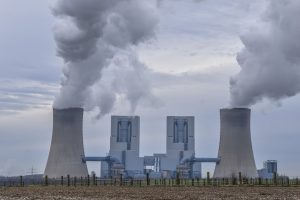By Jacob Elkin
Today, the Sabin Center filed an amicus brief on behalf of the National League of Cities and the U.S. Conference of Mayors in West Virginia v. EPA, a case that is currently before the United States Supreme Court. The case concerns the scope of the United States Environmental Protection Agency’s (EPA) authority to regulate greenhouse gas emissions from existing fossil fuel power plants under Section 111(d) of the Clean Air Act (CAA). 
In 2015, the EPA published the Clean Power Plan (CPP), which established mechanisms for reducing power plants’ greenhouse gas emissions that included shifting power generation toward lower- and non-emitting energy sources. EPA repealed the Clean Power Plan in 2019 and replaced it with the Affordable Clean Energy Rule, stating that Section 111(d) did not authorize the generation-shifting measures contained in the Clean Power Plan. In January 2021, the D.C. Circuit held that the 2019 Clean Power Plan Repeal and Affordable Clean Energy Rules were themselves based on a misinterpretation of EPA’s CAA authority and that the CAA’s text did not necessarily foreclose the sort of generation-shifting measures contained in the CPP. As of now, there is no rule governing greenhouse gas emissions from existing power plants in effect under Section 111(d).
Our amicus brief argues that significant federal regulation of power plants’ emissions is necessary to support and supplement local climate action. Cities are already affected by a concentration of adverse climate impacts, such as increased heat-related deaths, dirtier air, damaged and disappearing coastlines, longer droughts and other strains on water quantity and quality, increased wildfire risk, and increasingly frequent and severe storms. These impacts will only increase as climate change worsens. Cities across the country are engaged in combatting climate change through an array of mitigation and adaptation measures, but effective federal action is also needed. Consistent with the D.C. Circuit opinion below and in support of separate briefs submitted by EPA, a coalition of state attorneys general and cities, environmental organizations, and several utilities, our amicus brief argues that Section 111(d) does not foreclose generation-shifting regulation, and that neither the major questions doctrine nor the federalism clear statement canon are implicated by the case. Indeed, if the current challenges to EPA’s authority were to succeed, they would needlessly weaken an essential tool in the federal government’s toolbox for regulating greenhouse gas emissions and supporting local initiatives to do the same.
Read the brief here.
Jacob Elkin is a Renewable Energy Legal Defense Initiative Fellow at the Sabin Center.




